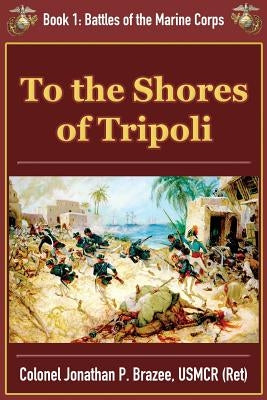1
/
of
1
Semper Fi Press
To the Shores of Tripoli
To the Shores of Tripoli
Regular price
$11.99 USD
Regular price
Sale price
$11.99 USD
Shipping calculated at checkout.
Quantity
Couldn't load pickup availability
The First Barbary War (1801-1805), or "America's First War on Terror," as some refer to it, was a pivotal moment in US history. While both the Navy and Marines participated in the Quasi-War with France, it was the war with the Barbary pirates that cemented both the Marine Corps and the Navy as the proud organizations that they are today. This was the war that produced heroes such as O'Bannon, Decatur, Preble, Porter, Hull, and Somers. To the Shores of Tripoli follows three fictional Marine privates as they participate in the watershed moments in the war. Private Seth Crocker is an uneducated, underage Marine who fights from the tops of the USS Enterprise and in battles such as the Gunboat Battle off the coast of Tripoli. Private Ichabod Cone, a veteran of the Revolution, is part of the crew of the USS Philadelphia when it is captured and spends most of the war as a slave of the pasha. Private Jacob Brissey is one of the seven Marines, under Lieutenant Presley O'Bannon, who march 600 miles across the desert against tremendous odds to attack and capture the city of Derne, where, for the first time in history, the US flag is raised over foreign soil. This book is historical fiction, but the events it describes are historical fact. Most of the characters actually existed and fought in the war. Where possible, their actual words are reproduced here. In all other cases, dialogue and characterizations were born in the author's imagination. The First Barbary War is considered the birth of the US Navy. It is equally valid to say that the war created the foundation for the Marine Corps as we know it today.
Author: Jonathan P. Brazee
Publisher: Semper Fi Press
Published: 03/11/2013
Pages: 188
Binding Type: Paperback
Weight: 0.57lbs
Size: 9.02h x 5.98w x 0.40d
ISBN: 9780615777207
Author: Jonathan P. Brazee
Publisher: Semper Fi Press
Published: 03/11/2013
Pages: 188
Binding Type: Paperback
Weight: 0.57lbs
Size: 9.02h x 5.98w x 0.40d
ISBN: 9780615777207
About the Author
Jonathan Brazee graduated from the U.S. Naval Academy and served 30 years in the Marines as a commander of infantry, recon, MSSG, and air delivery units as well as in various staff billets. He served with the 3d CAG as the military liaison to USAID in Iraq in 2006 and retired as a colonel in 2009. He is a life member of the Disabled American Veterans, the Veterans of Foreign Wars, and the U. S. Naval Academy Alumni Association.
This title is not returnable
Share


